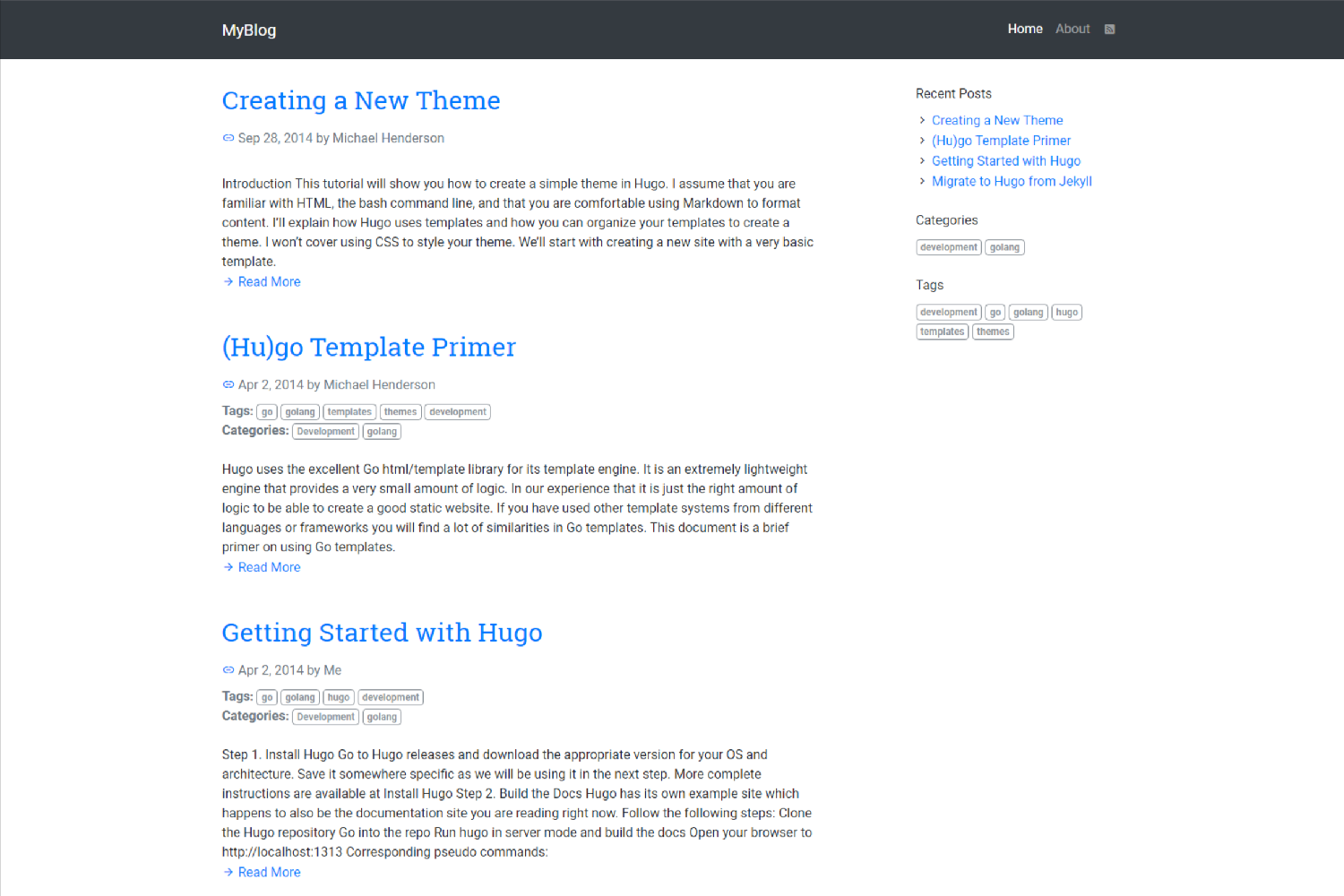Ecosyste.ms: Awesome
An open API service indexing awesome lists of open source software.
https://github.com/stuebersystems/hugo-theme-berlin
A simple Hugo theme using pure Bootstrap 5 and Bootstrap Icons without any custom CSS
https://github.com/stuebersystems/hugo-theme-berlin
bootstrap5 hugo hugo-theme
Last synced: 2 months ago
JSON representation
A simple Hugo theme using pure Bootstrap 5 and Bootstrap Icons without any custom CSS
- Host: GitHub
- URL: https://github.com/stuebersystems/hugo-theme-berlin
- Owner: stuebersystems
- License: mit
- Created: 2018-10-08T11:40:09.000Z (over 6 years ago)
- Default Branch: main
- Last Pushed: 2024-05-18T08:46:33.000Z (9 months ago)
- Last Synced: 2024-05-18T09:36:40.653Z (9 months ago)
- Topics: bootstrap5, hugo, hugo-theme
- Language: HTML
- Homepage:
- Size: 1.56 MB
- Stars: 3
- Watchers: 3
- Forks: 1
- Open Issues: 0
-
Metadata Files:
- Readme: README.md
- License: LICENSE
Awesome Lists containing this project
README
# Berlin - A Hugo theme
Berlin is a simple Bootstrap 5 based [Hugo](https://gohugo.io) theme for a blog website. It uses pure [Bootstrap 5](https://getbootstrap.com) without any custom CSS and [Bootstrap Icons](https://icons.getbootstrap.com/) Web Font for icons. The idea is to give you a framework for easy additional customization (e.g. CSS, custom fonts or own Bootstrap theme). This theme includes a sample blog for demonstration.
This theme is based on [Hugo Bootstrap v4 Theme](https://github.com/Xzya/hugo-bootstrap)
## Screenshots
The sample blog with Berlin theme but **without** any custom CSS.

The sample blog with Berlin theme and **with** additional custom CSS.

## Installation (under Windows)
Assuming you have already installed Hugo you should:
1. Open the Windows command prompt
2. Run `hugo new site c:\myblog`. A new Hugo project will be created.
3. Switch to that newly created folder with `cd c:\myblog`.
Now you need to install the Berlin theme. You can do that by cloning the GitHub repository with Git or by manually copying the files.
With Git:
1. Run `git clone https://github.com/stuebersystems/hugo-theme-berlin c:\myblog\themes\berlin`
Manually:
1. Open a Web browser and go to `https://github.com/stuebersystems/hugo-theme-berlin`
2. Download the repository as zip archive.
3. Extract the files to `c:\myblog\themes`.
4. Rename the extracted folder `themes\hugo-berlin-theme` to `themes\berlin`.
You are now ready to configure your blog and to write your first article.
## Sample blog
Let's set up a sample blog:
1. Go to `themes\berlin\exampleSite` and copy all files to `c:\myblog\`.
2. Run `hugo`. This will create your static pages under `c:\myblog\public`.
3. Run `hugo server` to start the embedded web server.
3. Open your web browser and navigate to `http://localhost:1313`.
4. Et voilà!
You can now study this example:
1. Sample configuration is inside `c:\myblog\config.toml`.
2. Sample custom CSS is found under `c:\myblog\static`
3. Sample custom layout overwrites are found under `c:\myblog\layouts`
4. And the sample blog posts are found under `c:\myblog\content`.
## Berlin theme specific configuration
Site related configuration:
Variable | Type | Description
---------------------------------- | ------ | ---------
Site.Params.Author | string | Default author
Site.Params.Description | string | Default description
Site.Params.Publisher | string | Publisher info (for schema.org support)
Site.Params.PublisherLogo | string | Publisher logo (for schema.org support)
Site.Params.DateFormat | string | Date format
Site.Params.Truncate | bool | Show blog post summaries in home page
Site.Params.MainSections | array | In which sections blog posts are located?
Site.Params.Areas.ShowRelated | bool | Show related posts for current blog post
Site.Params.Areas.ShowShareButtons | bool | Show social share buttons for current blog posts
Site.Params.Areas.ShowComments | bool | Enable comments for current blog posts
Site.Params.Sidebar.ShowRecent | bool | Show section "Recent" in sidebar
Site.Params.Sidebar.ShowTaxonomy | bool | Show sections "Tags" and "Categories" in sidebar
Site.Params.Sidebar.MaxRecentCount | int | Max count of recent links in sidebar
Page related configuration:
Variable | Type | Description
------------------| ----- | -----------
Params.Share | bool | Show social buttons for the current page
Params.NoComments | bool | Disable comments for the current page
Params.NoAuthor | bool | Do not show author for the current page
For build in variables of Hugo see [Variables and Params](https://gohugo.io/variables).
## More resources
* [Hugo Documentation](https://gohugo.io/documentation)
* [Hugo Themes](https://themes.gohugo.io)
* [Hugo on GitHub](https://github.com/gohugoio/hugo)